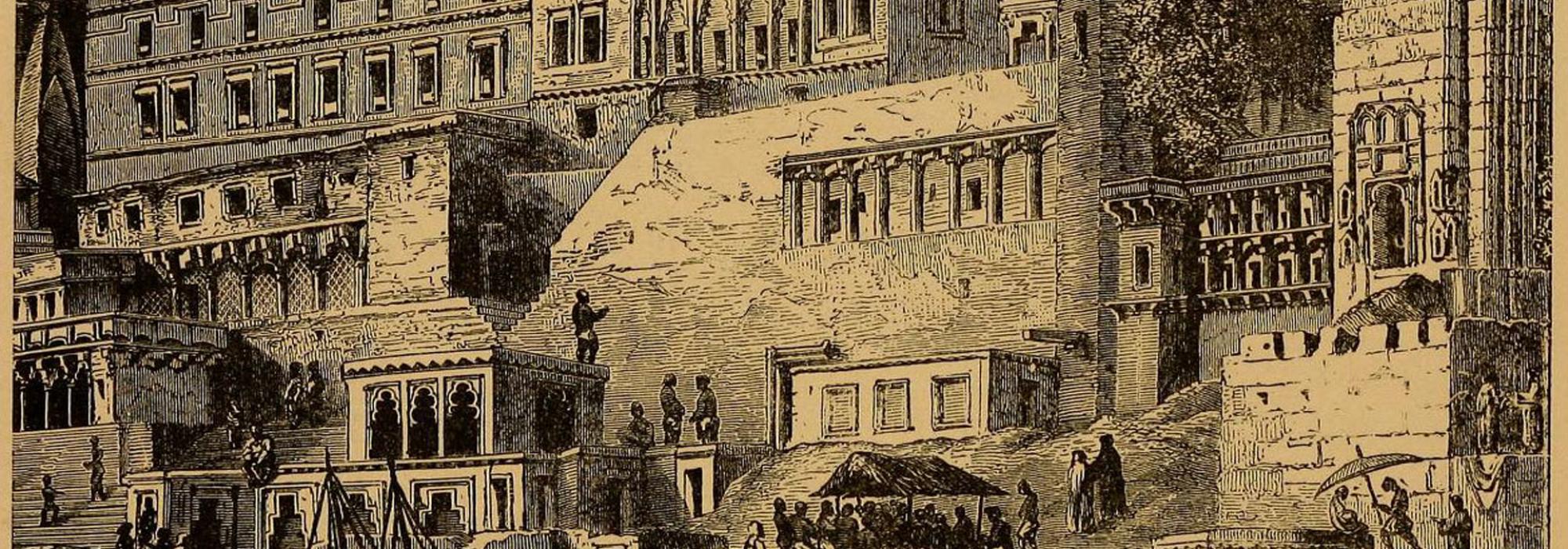Sarisava, a village near Amarāvatīpura of the Mithila province, was home to several erudite poets in the past. Mahāmahopādhyāya Bhavanātha-miśra, who lived in Sarisava in the latter half of the fifteenth century, was a great scholar, a connoisseur of the arts, and a gifted poet. Just like him, his son Śaṅkara-miśra was a polymath and a poet. Śaṅkara was a scholar of the four śāstras: pada-vākya-pramāṇa-vedānta and wrote several works on these, apart from composing a few poems and plays. A few episodes connected with them are narrated here.
Bhavanātha-miśra embraced saṃnyāsa in Kāśi in the traditional manner. At the same time, a few people, who were jealous of Śaṅkara-miśra’s growing fame, carried tales to him about his son constantly being in the company of prostitutes. Pained by this, Bhavanātha-miśra approached his son, and instead of raising the issue directly, he said what he had to say in the form of anyāpadeśa verses. Śaṅkara-miśra replied to his father in the same manner. Their intimate conversation is encapsulated in the following four verses:
FATHER
शैत्यं नाम गुणैस्तवैव तदनु स्वाभाविकी स्वच्छता
किं ब्रूमः शुचितां व्रजन्त्यशुचयः स्पर्शेन यस्यापरे ।
किं चातः परमस्ति ते स्तुतिकथा यज्जीविनां जीवनं
त्वं चेन्नीचपथेन गच्छसि पयः कस्त्वां निरोद्धुं क्षमः ।१।
“Coolness is your quality, purity is your very nature
People lose their impurities
when they come in contact with you
We are short of words to praise you
You are the very life of living beings
Oh Water! If you, endowed with such qualities,
choose to tread a lowly path,
who can stop you indeed?”
SON
तापो नोपगतस्तृषा न च कृशा धूता न धूली तनो-
र्न स्वच्छन्दमकारि कन्दकवलः का नाम केलीकथा?
दूरोन्मुक्तकरेण हन्त! करिणा स्पृष्टा न वा पद्मिनी
प्रारब्धो मधुपैरकारणमहो झङ्कारकोलाहलः ।२।
“Heat is not dispelled, thirst remains unquenched,
and the dust on the body stays unwashed;
(the elephant) hasn’t entered the water
and hasn’t fiddled with the lotus plants;
what sort of water-sport is that?
The elephant hasn’t stretched its trunk
towards the lotus and yet there is a furore
‘Alas! The intoxicated bees are
already creating a commotion
with their noisy buzzing and humming’.”
FATHER
परीवादस्तथ्यो भवतु वितथो वापि महतां
तथाप्युच्चैर्धाम्नां हरति महिमानं जनरवः ।
तुलोत्तीर्णस्यापि प्रकटनिहताशेषतमसो
रवेस्तादृक्तेजो न हि भवति कन्यां गतवतः ।३।
“An allegation, regardless of whether it’s true or false
tarnishes the greatness of good men
Although it has not yet entered Tulā and
even if it has succeeded in dispelling the darkness,
the sun that has entered Kanyā has lesser brilliance.”
SON
सुधांशोर्जातेयं कथमपि कलङ्कस्य कलिका
विधातुर्दोषोऽयं न च खलु कलानेतुरतुलः ।
स किं नात्रेः पुत्रो? न किमु हरचूडामणिरसौ?
न वा हन्ति ध्वान्तं? जगदुपरि किं वा न वसति? ।४।
“The moon, who radiates cool rays
that are like the elixir of life,
is black-spotted
The black spot is an error
of the Creator, not of the moon
Is he not the son of Atri
and the diadem of Śiva?
Does he not destroy darkness?
Does he not live high above the world?”
These conversation-verses have a refined lyrical beauty and reflect the affection the father and the son had for each other.
Translated by Arjun Bharadwaj and Shashi Kiran B N from the original Kannada.
This is an extract from the upcoming work 'Stories Behind Verses' – an English adaptation of Shatavadhani Dr. R Ganesh's Kannada classic 'Kavitegondu Kathe.'















































